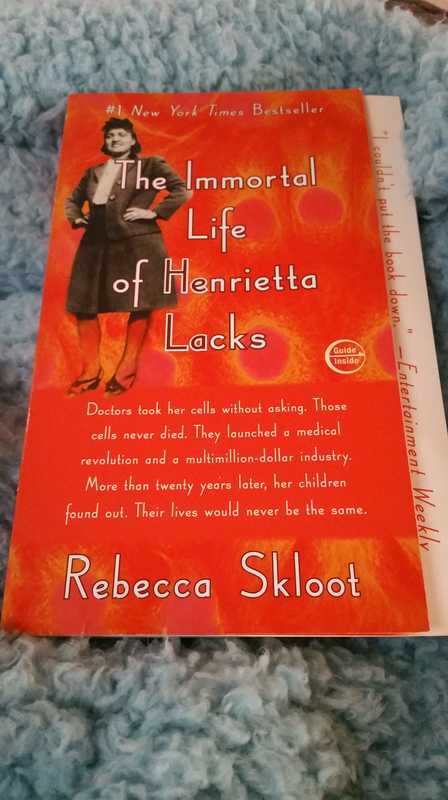Rebecca Skloot's The Immortal Life of Henrietta Lacks Review The Immortal Life of Henrietta Lacks by Rebecca Skloot The Immortal Life of Henrietta Lacks by Rebecca SklootMy rating: 5 of 5 stars Some books you read are entertaining, engaging, or page-turners. Some books are exciting, interesting, and fun. Although The Immortal Life of Henrietta Lacks has some of these qualities, there is one major quality that stands out from the rest: Importance. This book has great importance. Henrietta Lacks is a woman who has impacted millions of lives and probably indirectly impacted your life--yet few people know her story. Before Skloot, few people even knew her real name. This book is important because it gives a face to the name that has been so influential in science. Moreover, it is important because it addresses so many deep and potentially controversial issues, from racial tension to medical ethics to scientific research. This is a book to make you think but also to help you celebrate the life of a woman who certainly deserves our accolades. Henrietta Lacks died early in life from cervical cancer--but not before doctors at Johns Hopkins could take some of her cells for study. These cells proved immortal, leading to advances in tissue research and cell research. As the cells defied all odds of the time period and became immortal, they allowed for many scientific discoveries. The cells were used for everything from developing new medicines to searching for cures for cancer to testing nuclear radiation. Henrietta's cells quickly became the foundation worldwide for scientific study. This sounds like a noble pursuit and a positive thing. There are just a few problems with the endeavor. 1.) Henrietta Lacks never gave permission for this study, and her family was never even informed about the studies until years later 2.) The cells of Henrietta became a multi-million dollar industry, of which Henrietta's family never saw a penny. This book stirs so many emotions. First, I think this book stirs great sympathy. To read about Henrietta's immense suffering at the clutches of cancer is very sad. To hear about her families struggles afterward also really grips the reader. Skloot does an excellent job at portraying the human side of Lacks' story when no one else really did. Most only remember Henrietta as HeLa cells. They see her as a scientific commodity. Skloot puts emotion to the story and paints a picture of a strong woman dealt some difficult hands in life. I appreciated the honor and tribute Skloot paid to Henrietta in making her personal story known. The book also incited a lot of questioning and even anger within me. This story raises crucial questions about bioethics and how far science should go in the sake of discovery. The concept of medical testing and experimentation being done without consent was, quite frankly, frightening. It raises the question of ethics and what elements of the individual and privacy should be sacrificed in the name of science, a question that Skloot clearly emphasizes as a murky question. Although Henrietta's cells certainly lead to groundbreaking discoveries, the idea that this was done behind the family's back is angering. Perhaps the most frustrating part is the commercialism of the endeavor. The fact that these cells were sold for large amounts of money calls into question the motives of some of the scientists involved. The fact that the Lacks family struggled with poverty while scientists selling Henrietta's cells were making millions seems completely unjust. Finally, Skloot sheds light on racial tensions of Henrietta's time period. To learn about medical treatment--and the lack thereof--of African Americans during Henrietta's time period really opened my eyes. This is an issue not heavily discussed, but to hear about the lack of treatment or the sub par treatments afforded to certain races during this time period is angering. Skloot highlights how medical treatment and science aren't always a cut and dry issue. Politics, social values, and money all play a role in who gets treated and how. Some critics of this book find Skloot to paint herself as a hero. I did not find this to be the case. While she is inserted into the narrative throughout, it is to discuss her research endeavors. I believe this highlighted the depth and complexity of Henrietta's story. It showed just how much work it took for Skloot to find the truth. It showed how layered the truth was and how much mystery surrounded a woman who is still regarded as having the most important cells in science. I admire Skloot for all of the work she did to find the story and to tell the real truth about Henrietta Lacks. I do believe that paints her as someone to be admired. I did not feel like she wrote the book in a way that focused on that. I truly felt that her focus was on shedding light on Henrietta the woman instead of HeLa, the scientific entity. I believe she paid tribute to a difficult and sometimes controversial subject in the most sensitive, respectful way she could without sugarcoating the hard truths surrounding the story. This book should be read by everyone because of the importance of Henrietta's cells and how much they have contributed to science. I think we owe it to Henrietta to learn her personal story and to put a face, emotions, and personality to the cells talked about in scientific terms in so many contexts. I also think it is crucial that we explore the issues presented in this book such as tissue ownership, bioethics, and the motives of science in medicine in order to be prepared for the future. Henrietta's story is a cautionary tale in many ways. It cautions us to live life to the fullest, but it also cautions us that medicine is not always a cut and dry subject. Furthermore, it forces us to explore a human, controversial question about how much we are willing to sacrifice in terms of individual privacy and well-being for scientific exploration. Skloot's book does a beautiful job at weaving together these questions in bioethics with the personal tale of a woman I now feel like I know. She sheds light on a story often overlooked in history. Most of all, she puts a story to the woman, hands on hips, who appears in so many textbooks. Skloot has ensured that the world now knows her real name and much, much more. Thank you, Rebecca Skloot, for telling the story of a woman almost forgotten by science, by history, and by the world View all my reviews
0 Comments
Leave a Reply. |
*As an Amazon Affiliate, I get a small fee for any books purchased through the links below.
Archives
May 2024
Categories
All
|
















 RSS Feed
RSS Feed